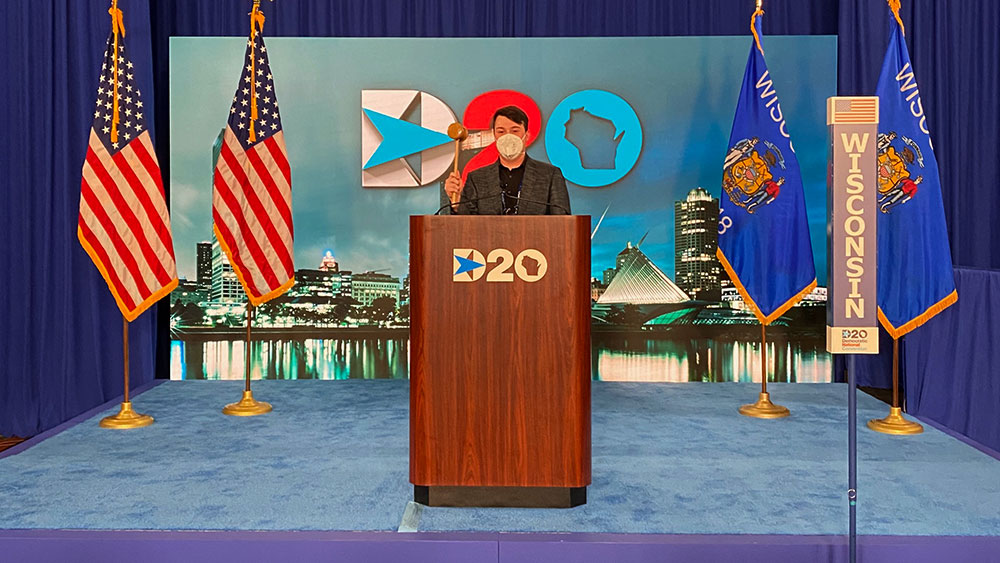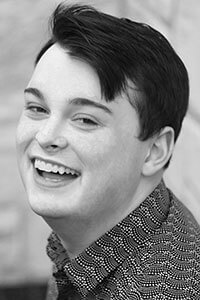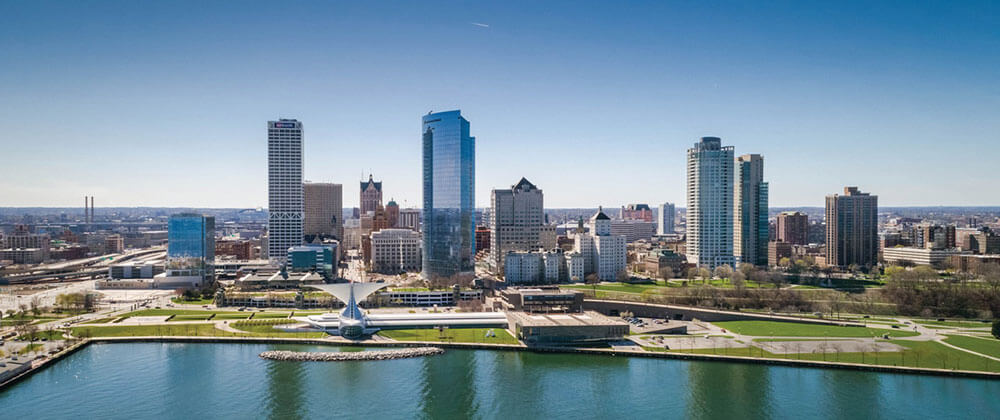
John Yoerger stands at the podium on the DNC stage at the Wisconsin Center in Milwaukee, Wisconsin.
At just 22, live events strategist John Yoerger’s resume lists experiences that rival those with decades under their belt. After working on SXSW and Sundance Film Festival, he was hired as associate director of housing and ancillary events for the 2020 Democratic National Convention (DNC). And that’s in addition to holding full-time roles in event planning for a local nonprofit while working on his degree at the University of Central Florida’s Rosen College of Hospitality Management. “Experience is the ultimate commodity for this industry. And that’s what I focused on,” Yoerger said. Yoerger shared with Convene his thoughts on building a career, what it was like working at the 2020 DNC, and what organizers should be thinking about right now.
On getting started in the industry:
[It] shocks a lot of people [that I was] the associate director of housing at what would have been a 50,000-attendee event [the DNC], but I signed my first near-million-dollar hotel contract when I was 19 that I negotiated myself, so, I’ve been on a different path for a while. I started working legally … in the industry when I was 16 and kept that momentum [going]. The goal was that I would graduate with entry-level working experience, but I advanced in opportunities, so I’m graduating with managerial-level experience and a CMP. I saw many people who were …graduating, maybe with their three required internships, and … then they go get like an entry-level job in the theme parks. And that’s just not what I wanted. I wanted to move faster and get deeper into the industry really quickly.
On getting a job at the 2020 DNC:
I applied for two and I ended up being interviewed and hired for the first one before I even interviewed for the second one. That was the housing position. They like to have people who come from political backgrounds as well as from the events background, so we had people on the team who were event professionals, and then we had people on the team who came from the political world. So even though they didn’t have the background to know what a rooming list is at a hotel, they had the background, contextually, to understand the needs of the party and the convention. So we really balanced each other out.

John Yoerger: ‘The biggest thing I learned was how amazing and incredibly resilient this industry and the people who work in it [are].’
I started when the convention was still full scope, so I was planning under the context of it being this 50,000-person event for several weeks before we started to press pause and say, this isn’t going to be able to be what we thought it would.
There’s only one so much you can plan for. We constantly joked that we felt like we were on like an ABC drama series. And I think we pivoted this event — like it had to be at least 20-plus times that the scope was changed. Just because of the nature of this pandemic, you can only be so prepared for what’s going to come next, so what it really comes down to is making sure that you are responsive — not reactive — to the constantly changing circumstances. And I think that was our biggest success.
At the beginning, our entire organization planned out these models for what the convention would look like and what it would take to implement different models. So from communications and public engagement to all of the operational departments like transportation, security, housing — we were all at that table, figuring out what each model would look like, what it takes to implement, what it would cost, and how we would get there. So then we had [plans] to draw from. Certain scenarios we couldn’t predict within those models, but then what that meant was, we were always just making decisions based on which model do we need to use [for] the optimal result in this situation as opposed to, “Oh, my gosh, we need a new model!”
On running the DNC’s housing program:
We had way more intimate conversations with our hotel partners than we normally ever would … because we had to play a really tough game of making sure that these hotels could even open. We were also strategic in where we placed attendees because we wanted to make sure the economic impact of the event still left a lasting impression on as many hotel partners as we could.

Milwaukee, where the Democratic National Convention was originally set to take place, was an inspired choice, John Yoerger said. (Courtesy VISIT Milwaukee)
On Milwaukee, the 2020 DNC’s host destination (where Yoerger lived leading up to and during the 2020 DNC):
Milwaukee was an inspired decision. They may not be the first destination that comes to mind when you want to host a citywide, but that’s part of why it’s such a hidden gem. And the ambiguity that comes with being off the map is like their secret weapon to surprise and overdeliver every time. They just came at us with grit, commitment, and passion for our events, and ready for all of the curve balls we could throw. I can’t speak highly enough of them and all that they did for our events and all that they can do for future events that come to their city.
On what’s next, and what planners should be thinking about for the future:
I just started my own LLC, JoYo. I’m [interested] in consulting for other events — organizations and event professionals who need high-level knowledge on implementing testing protocols and best practices related to infection mitigation.
I’m also going to compile a [handbook] of lessons learned and general guidance from a holistic perspective. There are so many little things that I learned throughout this process. For example, transmissibility of the virus and air conditioning — if you’re going to host an event in the first quarter of 2021, one of the things you should be saying to the hotel is, “I want MERV-13 air filters [or higher] in every guest room.”
And one thing for sure is that force majeure has to account not just for terminating the agreement but for allowing partial performance with reduced or eliminated attrition and minimums. Because of the unpredictable nature of this [pandemic], attendance numbers can change at the drop of a hat. Both parties need not only to act in good faith and support one another but to also be realistic about what can be achieved while not gouging or crippling the other. The other [condition precedent] that I think is really important to include in force majeure is the ability to terminate for any circumstance “causing frustration of purpose” — because as a legal standard, that may be easier to reach.
Jennifer N. Dienst is managing editor at Convene.
